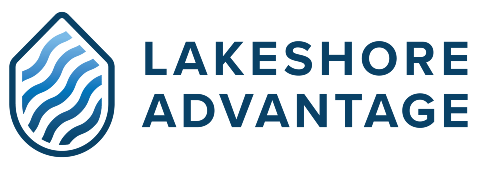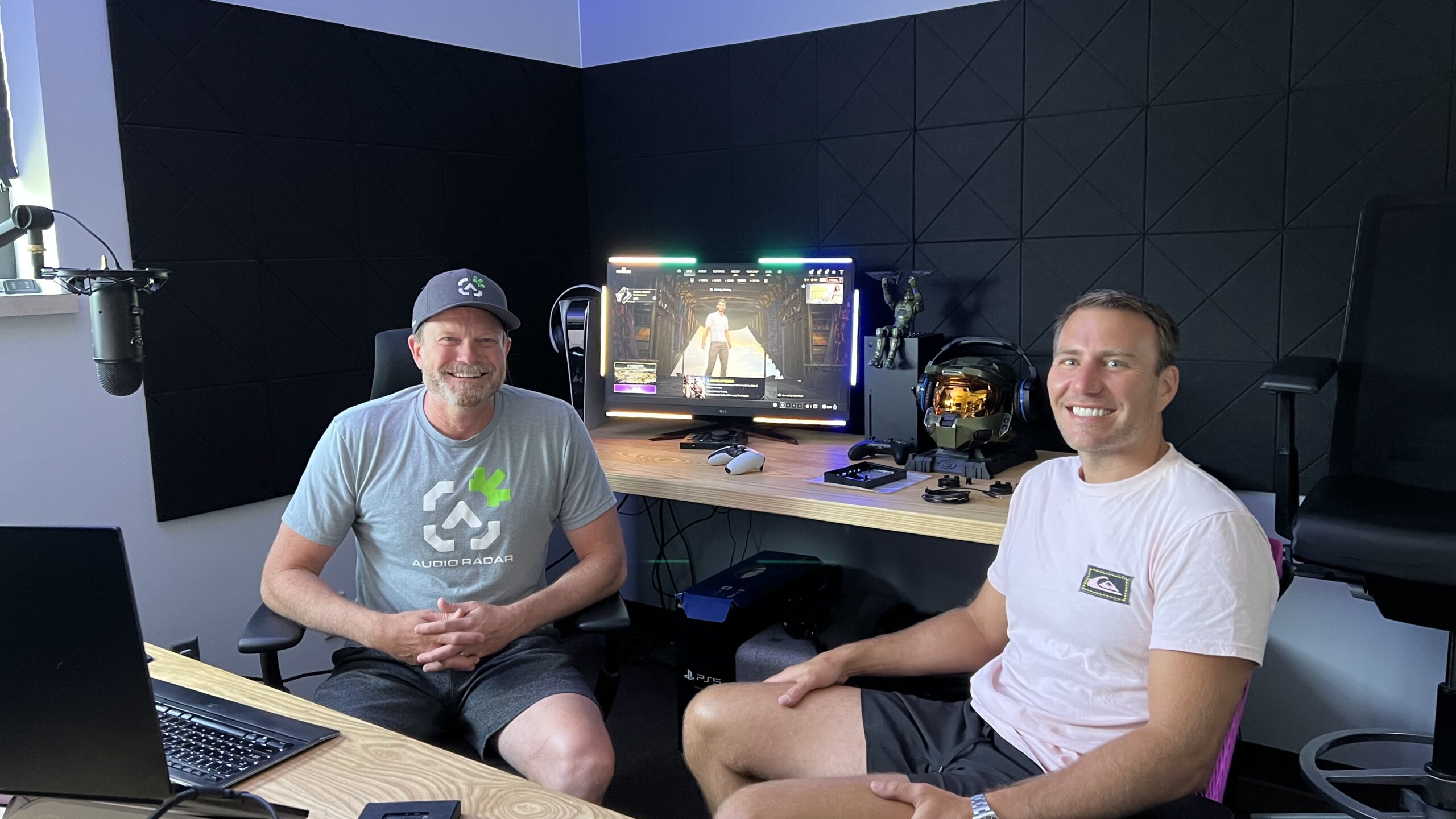| THURSDAY, AUGUST 10, 2023
This Q&A is part of a series that spotlights SURGE program entrepreneurs and explores the development of their products.
Tim Murphy is a two-time video-gaming accessories entrepreneur based out of Holland, Michigan, who over the years has leaned on Lakeshore Advantage’s entrepreneurial support program, SURGE, to help his ideas take shape.
I first met Tim at the SURGE Center in downtown Holland as he polished his pitch with fellow entrepreneurs. For me, coming from several years working at a nonprofit focused on — and cheering for — people with disabilities, his pitch caught my attention.
I recently sat down with him to get the skinny on his journey bringing his second product to market; what life is like as an entrepreneur; and to hear the advice he’d give others thinking of bringing an idea of their own to life. This conversation has been condensed and edited.
What are you currently working on bringing to market?
It’s called Audio Radar and it enables deaf and hard-of-hearing gamers to see the sound in video games. It’s a first-of-its-kind product, so it’s really exciting not to be launching just another gaming headset or controller. It’s unique, and it adds value — big value to deaf and hard-of-hearing gamers.
It also enables gamers who wear a standard gaming headset — 99% of gamers — to enhance their gaming experience. As soon as you put a headset on, you’re listening to stereo sound, not surround sound. The problem there is that game programs are so sophisticated now, designed for 7.1 surround sound, that if I put on the stereo headset I’m only hearing 2.1 stereo sound. I’m not getting the full depth of the experience.
 Audio Radar was invented to improve the gaming experience for gamers who are hearing impaired.
Audio Radar was invented to improve the gaming experience for gamers who are hearing impaired.
For example, if I am playing “Call of Duty” or “Fortnite” on a surround-sound system and I hear footsteps slightly to the left behind me; if I turn in that direction, it’s 100% accurate. But you only hear those directional cues if you have a really nice surround-sound system. The benefit for a big population of gamers with stereo headsets is that Audio Radar visualizes that 7.1 surround sound that’s really critical for gameplay, and now gamers can experience it even when wearing a headset. It visualizes directional, in-game sound cues like footsteps, gunshots, explosions, airplanes, and vehicles. That’s the whole premise behind Audio Radar.
For deaf gamers, this is the first time they’re experiencing gameplay on that level. Like, “Hey, there’s an airplane flying overhead” — if you’re a full-hearing gamer, you hear it, you look up and you can see the airplane that’s dropping a bunch of money or ammo that you need. If you can’t hear that, you’re blind to the cues. Audio Radar gives you that visualization.
So it’s first and foremost for deaf and hard-of-hearing gamers and for really competitive gamers who are full hearing.
What’s the origin story behind Audio Radar:
I was a radar technician in the Navy for six years prior to being an industrial product designer for corporations like Gentex and Whirlpool. So with those experiences, combined with owning a gaming accessory company and being a gamer myself, I noticed that the games were missing an element of depth. The fact that the games were designed for 7.1 surround sound and I’m only experiencing it in 2.1, I thought: “How can we make this better? Oh, let’s try and visualize it.” No one was doing it at the time. It was unique, and deaf and hard-of-hearing gamers could really experience something brand new.
It’s been an idea since 2016. It was too expensive then, so we tabled it. In 2019, we brought the idea back out of storage and built some mock-ups because the technology was catching up to the idea. We held a focus group in downtown Holland with 10 gamers. We had eight deaf or hard-of-hearing gamers and two full-hearing gamers. We had each of them demo an Audio Radar prototype by themselves, fill out a questionnaire, and then we brought them together for a focus group. I had been part of running a lot of focus groups for product and brand development. When I experienced this focus group, and the comments and reactions we received, I was super excited. It was a fantastic focus group, and we decided that we had to move forward.
One of the deaf gamers started tearing up and said, “Tim, I didn’t even know my own footsteps made this much noise in the game.” So, it was cool that these gamers could experience something brand new. That was a big turning point, just that one piece of feedback.
Then, I presented to the tech center here in Holland; they have a program for young game developers to get a game development degree. I presented Audio Radar, and one of the students emailed me after and she said, “Tim, I am a big-time gamer, and I’m losing my hearing. I’ll probably be deaf in three years and this product is amazing. I cried.” That was another reinforcement that this is a great product to work on. It felt like this is a product that is going to change lives. It feels kind of big.
There are around 3 million deaf and hard-of-hearing gamers in the United States and many more globally.
How did you get into gaming?
Earlier on, when I first got out of the military and started my first corporate job, I’d get online and play against old military friends around the U.S. It was a way for us to get together and hang out. We’d put on our headsets and game until the morning. We were talking smack and having fun; for me, the social aspect of gaming was really cool. For other gamers, it’s about the gameplay.
What attracted you to SURGE?
The meetups are great. Every meetup I’ve gone to I’ve left with a new bit of knowledge that I’ve followed up on. For example, one of the other SURGE members is a Facebook ads expert. I have invested significantly in Facebook ads since 2012. I’ve used a lot of different firms and individuals, and it all came back to needing to do it myself and being my own expert. When you run into locals you can talk shop with and compare notes with, that’s invaluable. Just meeting someone who knows their stuff and is passionate about what they’re doing has been big.
The biggest benefit of being a SURGE member, for me, has been Amanda Chocko, Director of SURGE Partnerships. Every time I’ve had coffee with Amanda, she’s made a connection with someone that has dramatically moved Audio Radar forward. I was telling her I needed some software development help. She made the connection to this group, SpinDance in Holland, and they helped with some of our firmware development.
Not only did she help me get the technical help to accelerate Audio Radar, but it was also through a second meeting with Amanda where she said, “You have to talk to this investor.” I had been trying to raise money for this product for a number of years, so it was a huge help. If I had not had that cup of coffee with Amanda through SURGE, we probably wouldn’t be where we are with Audio Radar — the project would probably be stalled.
It has taken a lot of networking, and making connections (and luck)!
What advice would you give to someone who is considering entrepreneurship?
If you don’t have experience in corporate, go out and work for other people. If you’re just out of college and you want to sell gaming accessories, go out and work for Best Buy, and when you do, look at that job from a different lens. Look at it from the perspective of, “What are these vendors doing?” “How are they interacting with Best Buy?” “How do their products look on the shelf?” “What products are moving faster than others?” Just look from a different view. You may be a stock person, or just working evenings, but if you go into it with curiosity, that experience is highly valuable.
Maybe 20 years ago, people would go to a corporation with the goal of working there for 20–30 years and then retire and that was the focus. Instead, go there and think: “OK, I’m going to poke my head into the marketing team, I’m going to look into engineering, and sales, and quality manufacturing, or logistics and supply chain from a different lens.” If you go to a company like Gentex, they are going to love someone who is so interested in all the different aspects of the company. As an entrepreneur, you’re going to need to know how to do a lot of that stuff on your own because it’s likely you won’t be funded to the point that you can hire everything out.
Where does Audio Radar stand and what’s next?
There is a relationship with Logitech — they’re supporting Audio Radar as our first customer. Logitech will be launching Audio Radar on their website when we launch. My partner, Andrew, and I flew out to California and presented it to Logitech last month. We’ve also presented it to Microsoft, who said, “We have nothing like this — your product is totally unique.”
We will be doing a soft launch in August when we’re shipping the product, and then full production in September or October.
Grace Maiullo is part of the Lakeshore Advantage team, where she’s responsible for communications and events management.



